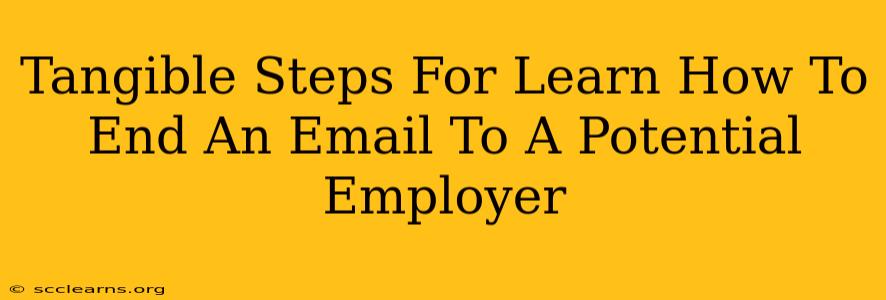Sending a professional email to a potential employer is crucial in today's job market. But it's not just about the compelling introduction and body; the closing is equally important. A strong email sign-off leaves a lasting impression and can significantly impact your chances of securing an interview. This guide provides tangible steps to help you master the art of ending an email to a potential employer effectively.
Understanding the Importance of a Strong Email Closing
The closing of your email serves as a final opportunity to reiterate your interest and leave a positive impression. A weak or inappropriate closing can undo all the good work you've done in the preceding paragraphs. It's your last chance to make a connection and encourage a response. Consider it your digital handshake – it needs to be firm, confident, and professional.
Why a Strong Closing Matters:
- Reinforces your interest: A well-crafted closing reaffirms your enthusiasm for the position and the company.
- Encourages a response: A clear call to action prompts the recipient to engage further.
- Creates a positive lasting impression: A professional closing leaves the reader with a positive feeling about your candidacy.
- Demonstrates professionalism: Your closing reflects your attention to detail and overall professionalism.
Step-by-Step Guide to Crafting the Perfect Email Closing
Let's break down the process of writing a compelling email closing for potential employers:
Step 1: Expressing Gratitude and Reiterating Interest
Begin by expressing your gratitude for the recipient's time and consideration. Avoid generic phrases; personalize your thanks by mentioning something specific from your conversation or their company. For example, instead of "Thank you for your time," try:
- "Thank you for taking the time to review my application and for sharing insights about [Specific company project or initiative]."
- "I appreciate you taking the time to speak with me today about the [Job title] position. I was particularly interested in learning about [Specific aspect of the job]."
Step 2: Including a Clear Call to Action
Every email should have a clear purpose. In this context, your purpose is to secure an interview. A strong call to action encourages the recipient to take the next step. Examples include:
- "I am available for a call at your earliest convenience to discuss my qualifications further."
- "I have attached my resume for your review and welcome the opportunity to discuss how my skills and experience align with your needs."
- "I look forward to hearing from you soon regarding the next steps in the application process."
Step 3: Choosing the Right Closing Salutation
The closing salutation should maintain a professional tone. Avoid overly casual closings like "Best" or "Cheers." Stick to classic and professional options such as:
- Sincerely,
- Regards,
- Respectfully,
- Best regards,
Step 4: Proofreading and Editing
Before sending your email, meticulously proofread and edit your entire message, including the closing. Typos and grammatical errors can undermine your credibility. Ensure your closing is concise, clear, and reflects your professionalism.
Examples of Effective Email Closings:
Example 1 (After a Networking Conversation):
Thank you for your time and valuable insights into the role of [Job Title] at [Company Name]. I was particularly interested in learning about [Specific topic discussed]. I've attached my resume for your review and would welcome the opportunity to discuss how my experience in [Relevant skill] aligns with your team’s needs. I look forward to hearing from you soon.
Sincerely,
[Your Name]
Example 2 (Following up on a Job Application):
Thank you for considering my application for the [Job Title] position. I'm excited about the opportunity to contribute to [Company Name]'s mission of [Company mission statement]. I'm available for a call at your earliest convenience to discuss how my skills and experience can benefit your team.
Regards,
[Your Name]
By following these steps and using the provided examples as a guide, you can confidently craft email closings that leave a positive and lasting impression on potential employers, significantly increasing your chances of securing an interview. Remember, the closing is your final opportunity to shine!

